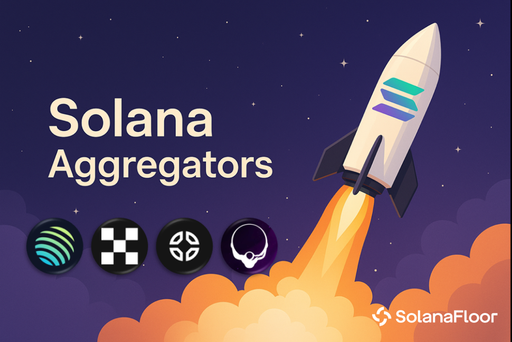
The Rise of Aggregators in Solana DeFi: Over 70% of DEX Volume Now Routed Through Aggregators, Reaching a 7-Month High
In early October, Jupiter captured over 53% of all aggregator-routed trades across every chain, despite operating solely on Solana
- Published:
- Edited:
Over the past year, Solana’s DeFi ecosystem has undergone a profound structural shift. Trading volume, once scattered across a handful of AMMs and order book protocols, is increasingly being funneled through aggregators. These platforms route user swaps across multiple liquidity sources to optimize execution. What began as a convenience feature has evolved into the defining layer of Solana’s DEX landscape.
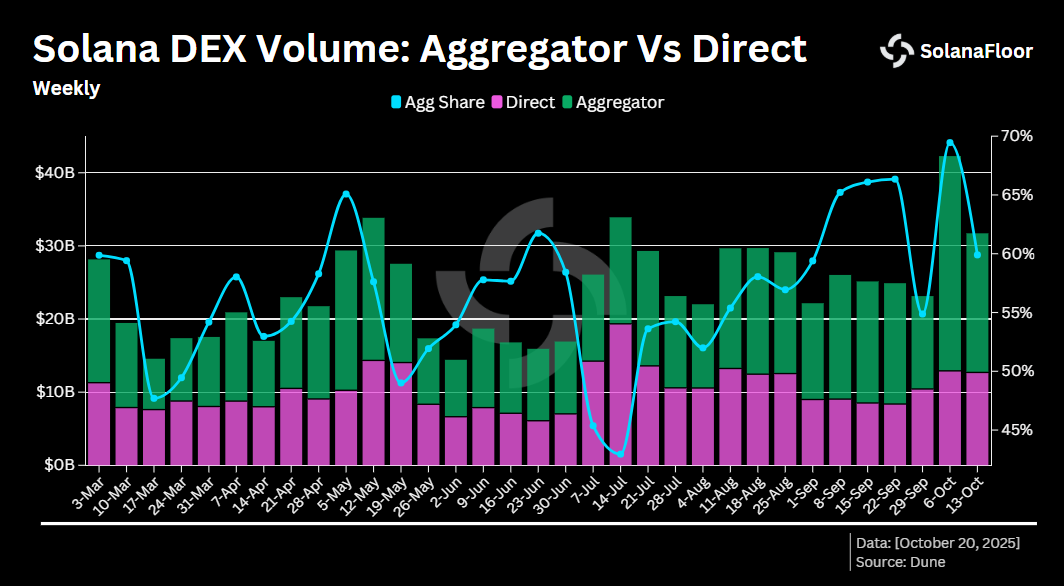 In recent weeks, aggregators have consistently routed more than 60% of all DEX trading volume on Solana. The trend culminated in the week of October 6, when aggregators captured 70% of total volume, marking the highest level in the past seven months. That same week also set a new benchmark for Solana’s Aggregator activity, reaching $29B in total routed volume. This figure highlights how deeply integrated aggregators have become in daily trading flows.
In recent weeks, aggregators have consistently routed more than 60% of all DEX trading volume on Solana. The trend culminated in the week of October 6, when aggregators captured 70% of total volume, marking the highest level in the past seven months. That same week also set a new benchmark for Solana’s Aggregator activity, reaching $29B in total routed volume. This figure highlights how deeply integrated aggregators have become in daily trading flows.
Jupiter’s Dominance and the Rise of New Aggregators
Among Solana’s four main aggregators, Jupiter remains the undisputed leader. Over the past week, it accounted for 81.6% of all aggregator activity on the network, a commanding position by any measure. However, this figure is down from its 99.9% share in mid-March, reflecting the gradual rise of new competitors such as OKX, DFlow, and Titan.
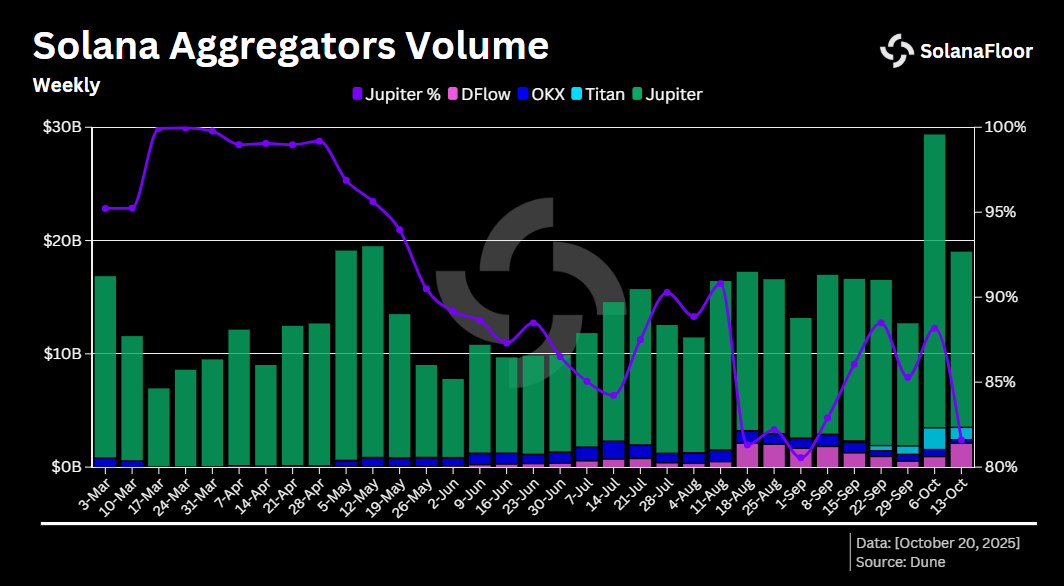 OKX in mid-July, routing more than $1.5B in volume and securing a 10.7% share that week. DFlow followed a similar growth trajectory, capturing 12.2% of total DEX volume in mid-August. More recently, Titan has expanded rapidly, routing $1.9B and taking a 6.5% share in early October.
OKX in mid-July, routing more than $1.5B in volume and securing a 10.7% share that week. DFlow followed a similar growth trajectory, capturing 12.2% of total DEX volume in mid-August. More recently, Titan has expanded rapidly, routing $1.9B and taking a 6.5% share in early October.
Despite these competitors, Jupiter continues to lead both within Solana and across the broader crypto market. It recorded a seven-month high of $25.8B in routed trades during the week of October 6.
Shifting Liquidity: Prop AMMs Take the Lead
An analysis of where aggregators route their trades reveals another major shift, the growing dominance of proprietary AMMs (Prop AMMs). Over the past seven months, these protocols have steadily absorbed routing volume that once flowed to legacy DEXs such as Raydium and Orca.
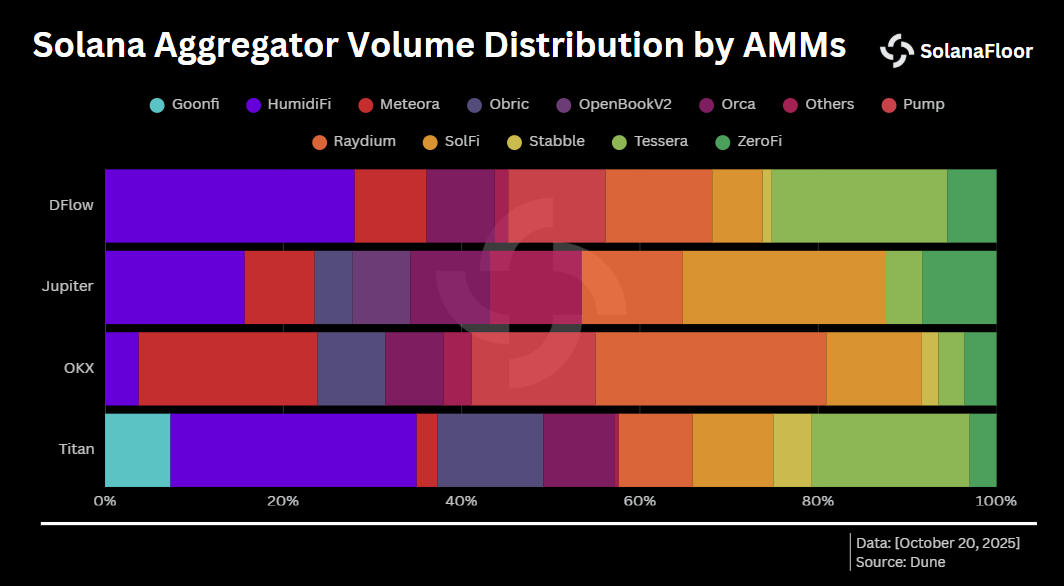 On Jupiter, SolFi and Humidifi now account for 21.1% and 16% of routed volume respectively, while Raydium ranks third with only 10.7%. On DFlow, Humidifi holds an even greater share of 33.2%, followed by Tessera at 18.9%. Titan exhibits a similar trend, where Prop AMMs collectively capture more than 61% of total routed trades, leaving traditional AMMs behind.
On Jupiter, SolFi and Humidifi now account for 21.1% and 16% of routed volume respectively, while Raydium ranks third with only 10.7%. On DFlow, Humidifi holds an even greater share of 33.2%, followed by Tessera at 18.9%. Titan exhibits a similar trend, where Prop AMMs collectively capture more than 61% of total routed trades, leaving traditional AMMs behind.
The only exception is OKX, where legacy AMMs still dominate routing preferences. On OKX, Raydium and Meteora hold 25.7% and 20% of routed volume respectively, while Prop AMMs such as SolFi and Humidifi trail behind.
Raydium’s Decline and Jupiter’s Internal Evolution
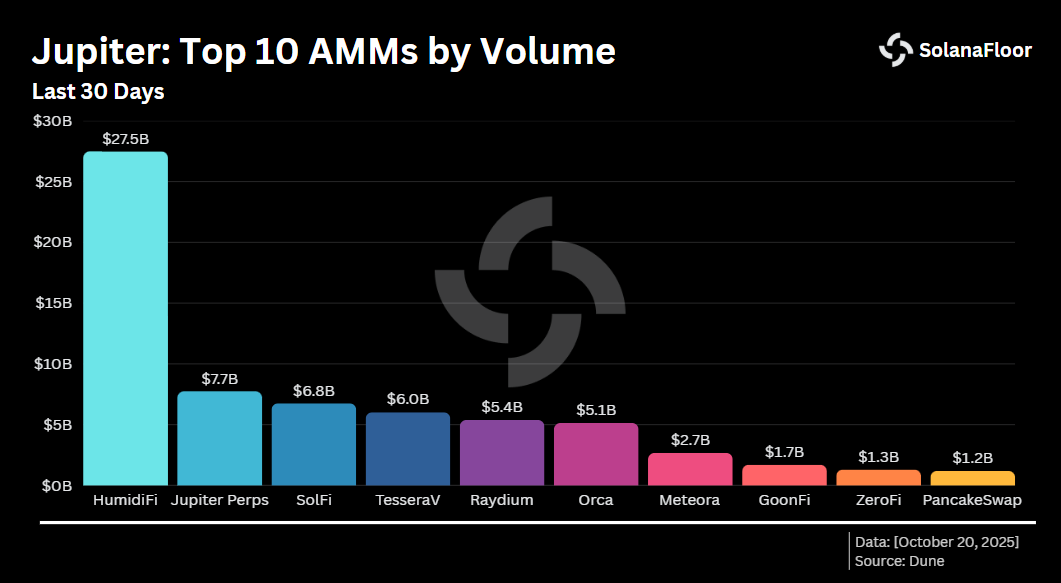 The internal composition of Jupiter’s routing further illustrates this transition. One year ago, in October 2024, Raydium handled over 40% of Jupiter’s routed volume. Today, that figure has fallen to less than 9%. In contrast, Humidifi now leads Jupiter’s routing destinations, processing $27.5B in volume over the past month, equivalent to more than 42% of all trades executed through Jupiter.
The internal composition of Jupiter’s routing further illustrates this transition. One year ago, in October 2024, Raydium handled over 40% of Jupiter’s routed volume. Today, that figure has fallen to less than 9%. In contrast, Humidifi now leads Jupiter’s routing destinations, processing $27.5B in volume over the past month, equivalent to more than 42% of all trades executed through Jupiter.
Meanwhile, Jupiter Perp, the aggregator’s perpetual integration, has grown to $7.7B in monthly routed volume, underscoring how Jupiter itself is evolving beyond a simple swap router into a full-stack DeFi hub. The sharp decline in Raydium’s share marks a clear turning point. Liquidity on Solana is no longer AMM-centric but aggregator-driven, where routing logic determines flow rather than pool ownership.
Beyond Solana: Aggregators Redefining Cross-Chain DeFi
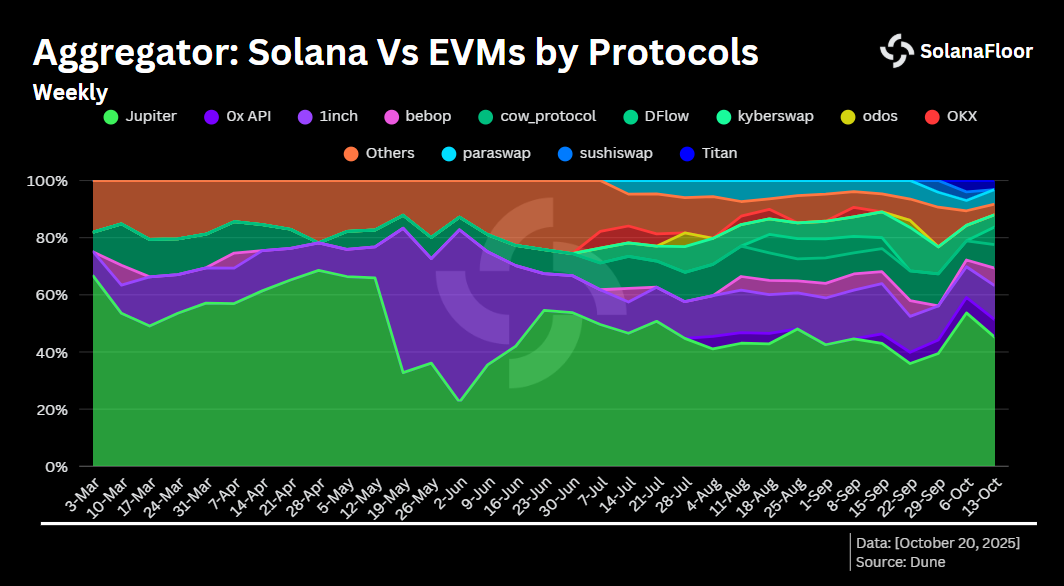 The influence of Solana’s aggregators now extends beyond the network itself. Across all blockchains, routed trading volume has surged from $15.9B in late June to over $42B in early October. Jupiter alone accounts for 53.6% of this total, a remarkable figure considering that it operates exclusively on Solana.
The influence of Solana’s aggregators now extends beyond the network itself. Across all blockchains, routed trading volume has surged from $15.9B in late June to over $42B in early October. Jupiter alone accounts for 53.6% of this total, a remarkable figure considering that it operates exclusively on Solana.
During the past week, Jupiter maintained 45.2% of all aggregator activity, far outpacing 1inch with 11.9% across 12 chains and Cow Protocol with 8.2% across 7 chains.
Solana’s Aggregator Era Has Arrived
The data paints a clear picture. Solana’s DEX ecosystem has entered its aggregator era. Execution is increasingly determined by intelligent routing rather than isolated pools, and volume concentration is shifting toward protocols capable of efficiently matching liquidity across the chain.
Jupiter’s continued dominance, along with the emergence of Titan, DFlow, and others, signals both competition and maturity within Solana DeFi. More importantly, the rise of Prop AMMs reflects a fundamental transformation where liquidity becomes programmable, composable, and optimized at the routing layer.
This piece is part of our Solana Data Insights series. Make sure to subscribe to Solana Data Insights for weekly onchain analysis.
Read More on SolanaFloor
Solana Launchpad Activity Falls 73% as Four.meme Rises on BNB
What’s Really Happening with Solana in 2025?


